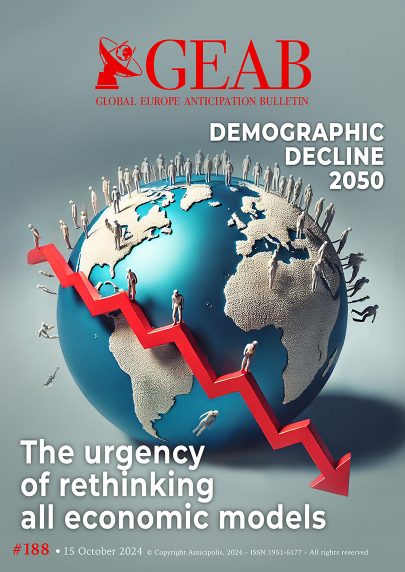GEAB 188

In 2048, Israel, far from celebrating its centenary, may no longer exist in its current form. The challenge does not come from its external enemies, but from demographic challenges, internal social fragmentation and an exodus of its most educated population. The country’s future will depend on its ability to reinvent itself, or disappear.
No, it will not be Iran that destroys Israel, nor Hamas: it will be the Israelis themselves who leave the project. The trend is already well underway. Explanations:
This issue of the GEAB looks ahead to 2050 on the basis of demographic facts. The question of who is having children is one of the main themes, migration is another, as are all the major structural trends affecting populations. But what characteristics of the Israeli population are currently emerging?
Declining fertility: Demographic erosion on both sides of the conflict
This is the most obvious fact, the most commented on, but ultimately the least interesting. Israel has long been concerned that Arabs are having more children than Jews, and that the Jewish state could eventually become predominantly Muslim.
Login

This issue reminds everyone (readers and writers alike) of the extent of the statistical fog currently defining our times. In choosing demography this month, you may say that we focused [...]
Population decline threatens to become collapse. Whatever happens, it will lead to some form of economic decline. Our economic models, based on infinite growth, need to be reinvented. Degrowth is [...]
Changes in the attractiveness of different regions and in their attitudes to accepting foreign populations will naturally lead to a reorganisation of migratory flows. In this major rebalancing, the EU [...]
The birth rate has always been very high in religious, traditionalist and conservative communities. To anticipate what our future generations will be dreaming of, it is vital to ask which [...]
Last month our team published its calendar of future global geopolitical events up to January 2025. The calendar was so full that we were unable to mention the economic, monetary [...]
Lithium concentration continues Last week, Rio Tinto, an Anglo-Australian major in the lithium sector, confirmed the purchase of Arcadium Lithium, which owns the main lithium mine in Argentina, one of [...]


Comments